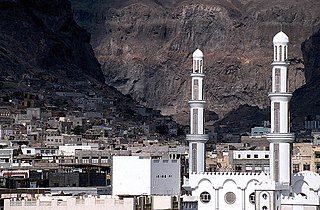
Aden is a port city located in Yemen in the southern part of the Arabian peninsula, positioned near the eastern approach to the Red Sea. It is situated approximately 170 km east of the Bab-el-Mandeb strait and north of the Gulf of Aden. With its strategic location on the coastline, Aden serves as a gateway between the Red Sea and the Arabian Sea, making it a crucial maritime hub connecting Africa, Asia, and the Middle East. As of 2023, Aden City has a population of approximately 1,080,000 residents, making it one of the largest cities in Yemen. Aden is divided into eight districts: Tawahi, Mualla, Crater, Khur Maksar, Al Mansura, Dar Sad, Sheikh Othman, and Al Buraiqa. These form today's Aden Governorate. During the period of the British colonialism, Aden referred to the area along the north coast of the Gulf of Aden, encompassing Tawahi, Mualla, Crater, and much of Khur Maksar District. The western harbour peninsula, known as Little Aden, now falls within the Al Buraiqa District.

The South Yemen insurgency is a term used by the Yemeni government to describe the protests and attacks on government forces in southern Yemen, ongoing since 27 April 2009. Although the violence has been blamed on elements within the southern secessionist movement, leaders of the group maintain that their aims of independence are to be achieved through peaceful means, and claim that attacks are from ordinary citizens in response to the government's provocative actions. The insurgency comes amid the Shia insurgency in the country's north as led by the Houthi communities. Southern leaders led a brief, unsuccessful secession in 1994 following unification. Many of them are involved in the present secession movement. Southern separatist insurgents are active mainly in the area of former South Yemen, but also in Ad Dali' Governorate, which was not a part of the independent southern state. They are supported by the United Arab Emirates, even though the UAE is a member of the Saudi Arabian-led coalition working to support the Yemeni government.

The Southern Movement, sometimes known as the Southern Separatist Movement, or South Yemen Movement, or Aden Movement, and colloquially known as al-Hirak, is a political movement and paramilitary organization active in the south of Yemen since 2007, demanding secession from the Republic of Yemen and a return to the former independent state of South Yemen. At present, its best-known political offshoot, the Southern Transitional Council led by Aidarus al-Zoubaidi, is the de facto leadership across many provinces of the south.

Vehicle registration plates of Yemen started in 1993. The current version started in 2018 used FE-Schrift typeface for alphanumeric and Square Kufic typeface for Arabic text.

Saleh Ali al-Sammad was a Yemeni political figure from the Houthi movement who served as the chairman of Yemen's Supreme Political Council and the de facto President of Yemen until his assassination.
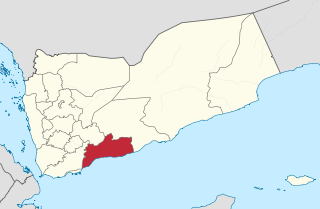
The Abyan campaign was a 2015 campaign for control of the Abyan Governorate of Yemen, between the Houthis and Yemen Army units loyal to Ali Abdullah Saleh on one side, and militiamen and Yemen Army units loyal to Abd Rabbuh Mansur Hadi on the other side, supported by jihadists of al-Qaeda in the Arabian Peninsula. The pro-Hadi forces recaptured the Abyan Governorate on 11 August 2015, after launching an offensive on pro-Houthi forces in early August.
This is a detailed timeline of the Libyan civil war (2014–2020) which lasted from 2014 to 2020.
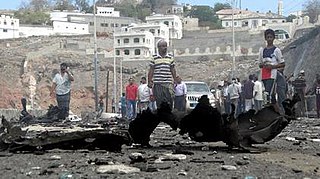
The Aden unrest was a conflict between Islamist factions, such as al-Qaeda in the Arabian Peninsula, and Islamic State of Iraq and the Levant's Yemen Branch, against the loyalists of president Abd Rabbuh Mansur Hadi and later to conflict between UAE-backed and Saudi-backed factions within the coalition. In 2017, fighting also broke out between factions aligned with different members of the Saudi-led coalition namely Saudi Arabia-backed Abdrabbuh Mansur Hadi and Al-Islah and UAE-backed separatist Southern Transitional Council and Southern Movement.
The following is a timeline of the Yemeni civil war, which began in September 2014.

The Southern Transitional Council is a secessionist organization in southern Yemen. The 26 members of the STC include the governors of five southern governorates and two government ministers. It was formed by a faction of the Southern Movement. It was established in 2017, and it has called for and worked toward the separation of southern Yemen from the rest of the nation as it previously was until 1990.
The Hadramaut insurgency was an insurgency in Yemen launched by AQAP and ISIL-YP against forces loyal to president Abdrabbuh Mansur Hadi.

The Battle of Aden was a conflict between the Southern Transitional Council (STC) and the Yemeni government around the headquarters in Aden.
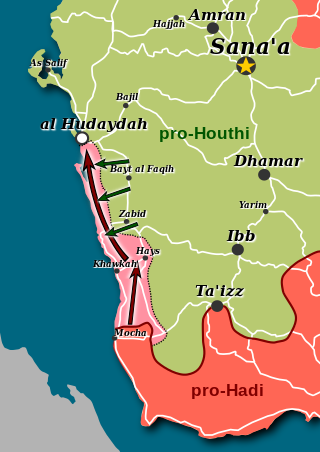
Al Hudaydah offensive, also called Western Coast Offensive, describes the offensive launched in December 2017 by pro-government forces against the Houthis in Al Hudaydah Governorate as part of Yemen's 2015 civil war. As of December 2018, the pro-government forces have captured the towns of Al Khawkhah, Hays, At Tuhayta, and brokered a ceasefire in Al Hudaydah City. In November 2021, a coalition withdrawal led the Houthi forces to break the siege of Al Hudaydah and recapture At Tuhayta.
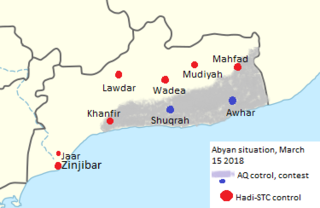
The Abyan conflict was a series of clashes between forces of AQAP loyal to Yemeni president Abdrabbuh Mansur Hadi, and forces loyal to Southern Movement for the control of Abyan between 2016 and 2018.
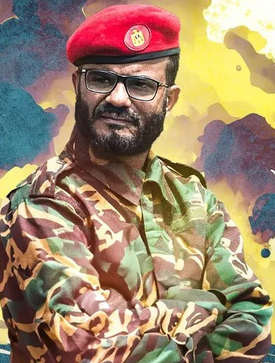
Abdullatif Al-Sayed Bafaqih was a Southern Yemeni warlord from Abyan who played a major role during the wars against Al-Qaeda after 2012 in Abyan Governorate.

The Tihamah Resistance is an armed group formed by locals of Yemen's Tihamah Region, aiming to resist Houthi control of the west coast region of Yemen. The group was formed in 2014, when Houthis seized Al Hudaydah and the rest of North-Western Yemen. The group was active in 2015 at the start of the war, participating in the Battle of Taiz on the side of the pro-Hadi coalition. In December 2017, the group took part in the Al Hudaydah governorate offensive, alongside UAE, Saudi, Hadi loyalists and Southern Movement fighters. The group is closely aligned with Tareq Saleh's National Resistance, and the Giants Brigades.

The Battle of Marib is an ongoing battle that began in February 2021 following the advance of the Houthis towards the city of Marib, the capital of Marib Governorate in Yemen controlled by the Cabinet of Yemen.
The Riyadh Agreement was signed on 5 November 2019 in the capital city of Saudi Arabia, Riyadh, between Abdrabbuh Mansur Hadi, representing the Saudi-backed government of Yemen, Muhammad bin Zayid Al Nahyan, representing the United Arab Emirates, and Aydarus az-Zubaydi, representing the UAE-backed Southern Transitional Council (STC). It followed the Southern Yemen clashes of August 2019, with the goal of ending the fighting and establishing a united front against the Iran-backed Houthi rebels, dominant in the north of the country.

In August 2022, forces of Yemen's Emirati-backed separatist Southern Movement, mainly represented by the Southern Transitional Council, launched an offensive in the Abyan and Shabwah provinces. Initially, the Southern forces mostly fought against Saudi-backed government forces, most of which belonged to the armed wing of the Islah party. Since early September 2022, however, the Southern Movement's offensive has become more focused on battling local al-Qaeda strongholds.
On March 23, 2022, Houthis assassinated Yemeni army commander Thabet Gawas and three others in a car bombing in Aden, Yemen.















